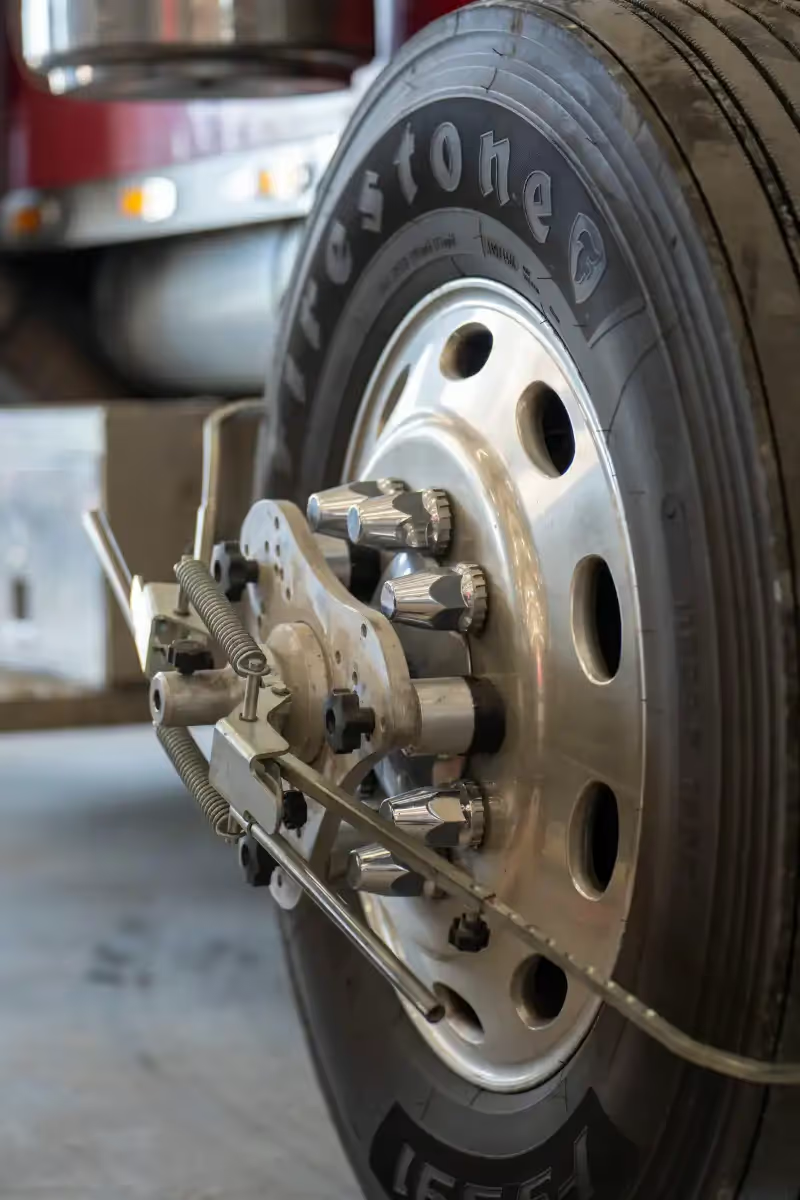The Importance of Semi Truck Tire Maintenance
Proper tire maintenance is essential for semi trucks. From inflation checks and tread depth to alignments and rotations, staying proactive boosts safety, fuel efficiency, and uptime while avoiding costly breakdowns and violations.
.jpg)
The Role of Tires in Heavy-Duty Performance
Semi-trucks haul tremendous loads across thousands of miles. Each tire on a commercial truck bears thousands of pounds of weight, especially when loaded to capacity. A compromised tire doesn’t just risk a delay—it risks catastrophe.
Tires are responsible for:
- Supporting vehicle load
- Absorbing road shocks
- Providing traction for acceleration, braking, and steering
- Maintaining directional stability
Tread Depth and Wear Patterns
One of the primary indicators of tire health is tread depth. Federal regulations require a minimum tread depth of 4/32” on the front tires and 2/32” on others. Letting tread drop below these levels isn’t just unsafe—it’s illegal.
Uneven wear patterns signal alignment issues, suspension problems, or improper inflation. For instance:
- Cupping often indicates worn-out suspension components.
- Feathering points to alignment issues.
- Center wear usually results from overinflation.
- Edge wear typically stems from underinflation.
Each of these issues compromises traction, increases stopping distance, and accelerates tire failure.
The Inflation Equation
Underinflated tires are a leading cause of blowouts. When tire pressure dips below the manufacturer’s specification, the sidewalls flex excessively, generating heat. Excessive heat leads to ply separation and eventually a blowout.
Conversely, overinflated tires reduce the contact patch, leading to decreased traction and premature center tread wear. Proper inflation not only enhances tire longevity but also improves fuel efficiency—every 10 psi below optimal inflation can reduce fuel economy by up to 1%.
Industry professionals recommend daily pressure checks using calibrated gauges and adjusting for ambient temperature changes. Tires can gain or lose 1 psi for every 10°F change in temperature.
Regular Inspections and Preventive Maintenance
Routine inspections are the backbone of a sound tire maintenance program. This includes:
- Visual Checks: Look for cracks, bulges, embedded objects, and sidewall damage.
- Tread Depth Measurements: Monitor wear trends.
- Valve Stem Integrity: Ensure stems are free from leaks or damage.
- Tire Rotation: Balance wear across the entire set.
Incorporating tire inspections into your preventive maintenance schedule—especially during DOT inspections—is essential. These inspections are designed to catch issues like worn tires before they escalate into serious safety violations or mechanical failures.
Alignment and Suspension Considerations
Tires are only as good as the components that support them. Misalignment not only causes erratic tire wear but also creates drag, reducing fuel efficiency. Similarly, worn shocks and bushings compromise ride quality and increase tire wear due to excessive vibration and load shifts.
A good rule of thumb? Inspect alignment after any major steering or suspension repair, or if abnormal tread wear patterns appear.
Retreading and Replacement Intervals
Retreading is a cost-effective solution when done correctly. Fleets using retreads must inspect casings thoroughly and rely on reputable retreaders. That said, knowing when to replace tires entirely is crucial. Excessive tread separation, exposed cords, and irreparable punctures are red flags demanding immediate action.
Tire Storage and Seasonal Strategies
Even unused tires degrade if stored improperly. Tires should be kept in cool, dry places away from direct sunlight and ozone-producing equipment like electric motors. Rotating inventory ensures older tires are used first—a principle known as FIFO (First In, First Out).
Additionally, switch to winter-specific tires when traveling in colder climates to maintain traction and braking performance.
The Cost of Neglect
Failing to maintain semi truck tires leads to:
- Increased downtime due to blowouts
- Higher fuel costs
- Safety hazards and potential accidents
- Violations during roadside inspections
- Decreased tire life and unnecessary replacement expenses
Investing in regular maintenance translates to fewer headaches, better uptime, and safer roads for everyone.
Stay Ahead of Tire Issues
Your truck’s tires are its foundation—quite literally. Proactive tire maintenance is a small price to pay for the safety, efficiency, and legal compliance it ensures. Through proper inflation, routine inspections, timely rotations, and alignment checks, your fleet in Spartanburg, SC can keep rolling strong and safe across state lines.
Need a professional inspection? Schedule an appointment with Buchanan Diesel today.
Additional Articles

Taking Your Ride to the Next Level: Understanding Wide-Body Kit Installations

The Advances & Benefits of Diesel Technology
Contact us To Schedule Service
Have questions or want to schedule your vehicle in for a repair or service? Get in touch, we're open Monday through Friday from 8:30AM to 5:00PM.
Serving Southwest Michigan & Michiana, including Buchanan, Niles, St. Joseph, Benton Harbor, & Dowagiac, MI, & South Bend, Elkhart, IN & surrounding areas.

